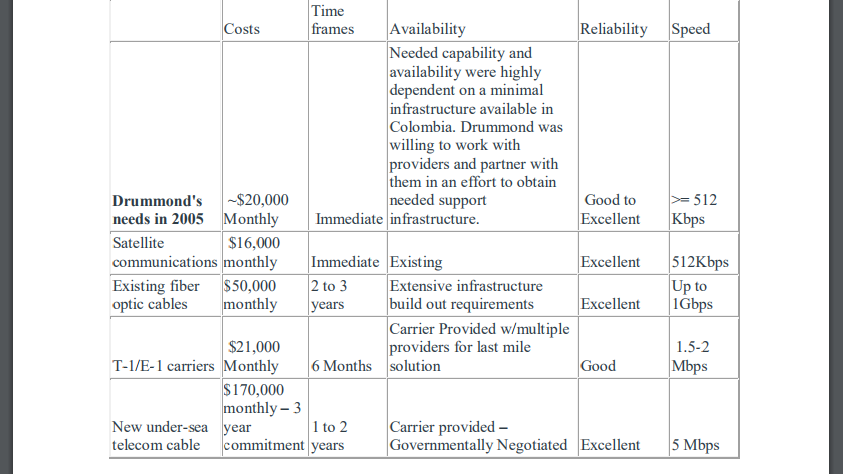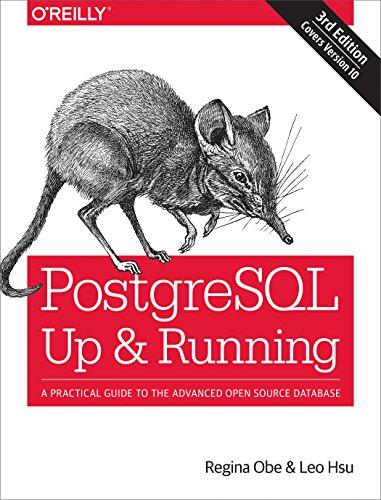Question
Drummond Company began in Sipsey Alabama in 1936 as a coal provider for farms and homes. The company has passed from H. E. Drummond, the
Drummond Company began in Sipsey Alabama in 1936 as a coal provider for farms and homes. The company has passed from H. E. Drummond, the founder, to the second generation of family members, and is now headed by Mr. Garry Drummond. As the company grew, so did production of coal. Between 1960 and 1970 Drummond began selling coal to Japan. In 1976 Drummond began selling coal to Alabama Power. In the mid 1980s the company began producing coke for use in steel production, and began laying the political and operational groundwork for expanding coal-mining operations into Colombia, where they are still aggressively operating.
As Drummond began to actively mine coal in the early to mid 1990s there were three primary pieces to the operation; the mine in La Loma-Cesar which is about 120 miles inland from the coast, the port near Santa Marta, Colombia, where a conveyor belt loads coal onto ships bound for Europe, and the railroad that transports coal from the mine to the port. At the beginning of mining operations in the early 1990s, the companys telecommunication infrastructure in Colombia was limited to voice calls. Drummond had a Private Branch Exchange (PBX) that handled internal calls at the port and another PBX at the mine. Drummond depended only on the local telephone company for communication between the port and mine. Calls back to the Birmingham office were through the local phone companys connection to the intercontinental long distance system. Calls between the port and mine, and the long distance calls were unreliable, slow to set up, and very costly (many thousands of dollars a month).
Question 1: By 2005 the state of telecommunications and computing was rapidly changing. The company decided that it was important to connect the computers at the mine, the port, and the Birmingham office for the purpose of communicating accounting information. They also wanted to improve the voice communications. Options to connect the three systems were still limited. Satellite communications were available at 512 KBps. But the cost was relatively high, and due to the high orbit (22,236 miles), there is a significant and annoying delay in the signal for voice communications. Fiber optic cables into Colombia from the USA were relatively rare but could be available at very significant cost. U.S. T-carrier (e.g. T-1: 1.544 Mbps) and European E-1 (2 Mbps) twisted pair copper wires were available but difficult and expensive to obtain. During this Internet Boom period, a number of companies began laying bundles of under-sea telecommunications cables. However this was extremely expensive and Drummond only needed a small portion of bandwidth within a cable. It would also put Drummond in the role of being a telecom company, which is not the primary focus of a coal mining company. A number of companies began offering hardware that allowed phone signals from a PBX to be digitized and transmitted as Internet packets (VOIP).

Based on the telecommunication options of 2005, select a telecommunications solution or craft one of your own for Drummond and EXPLAIN why you chose that answer.
1. In partnership with the Colombian phone company ETB (Empresa de Telecomunicaciones de Bogot S.A.), run an under-sea cable to the United States. Use the cable for Drummonds needs and sell the excess bandwidth. Establish VOIP communications to the Birmingham office. Run a Drummond-owned fiber optic cable between the port and the mine.
2. Make arrangements to have access to one of the expensive and rare already-existing fiber optic cables back to the USA. Run a fiber optic cable along the rail right-of-way. Use VOIP to connect the PBX to the Birmingham office.
3. Acquire a data channel on a satellite for communications between Birmingham and the mine. Acquire a second satellite data channel for communications between the mine and the port. Use VOIP to connect voice communications to the satellite channels.
4. Craft your own solution
Time frames Availability Costs ReliabilitySpeed Needed capability and availability were highly dependent on a minimal in frastructure available in Colombia. Drummond was willing to work with providers and partner with them in an effort to obtain needed support Drummond's$20,000 needs in 2005 Monthly Satellite Good to512 Excellent Kbps Immediate infrastructure. $16,000 ions monthly Immediate Existing Excellent 512Kbps Up to optic cables monthly yearsbuild out requirements Excellent lGbps Existing fiber S50,000 2 to 3 Extensive infrastructure Carrier Provided w/multiple providers for last mile $21,000 1.5-2 Mbps T-1/E-1 carriers Monthly 6Months solution Good S170,000 monthly -3 New under-sea year telecom cable commitment yearsGovernmentally Negotiated Excellent 5 Mbps 1 to 2 Carrier providedStep by Step Solution
There are 3 Steps involved in it
Step: 1

Get Instant Access to Expert-Tailored Solutions
See step-by-step solutions with expert insights and AI powered tools for academic success
Step: 2

Step: 3

Ace Your Homework with AI
Get the answers you need in no time with our AI-driven, step-by-step assistance
Get Started


